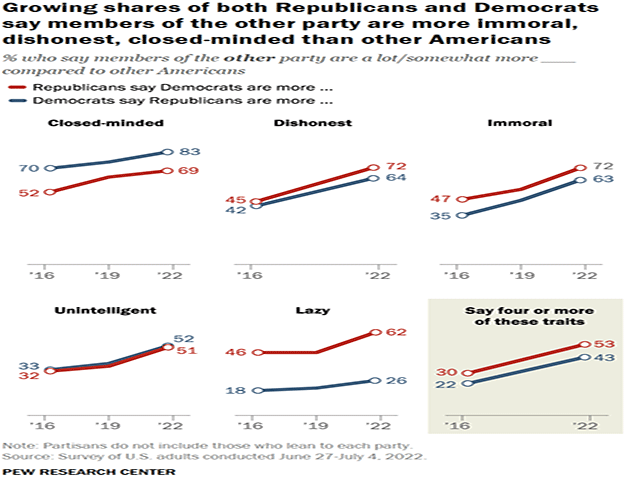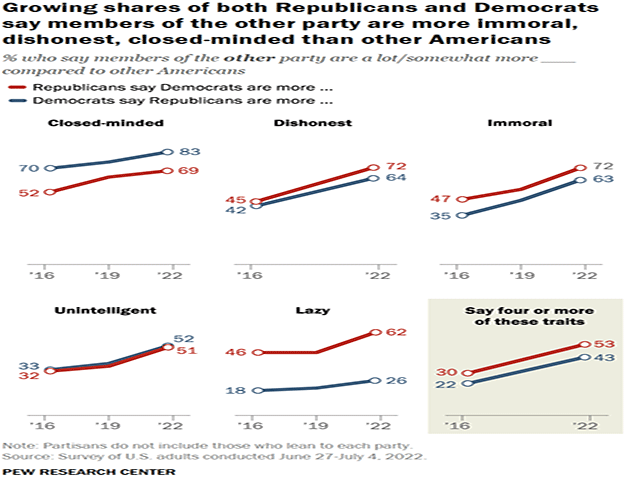An Urban's Rural View
No, Those Who Disagree With Us Aren't Animals
People sometimes talk about political polarization as if it were about extreme ideologies -- more and more people concentrated at the far ends of the political spectrum. Unfortunately, that's only part of it. The bigger problem is that folks who were once merely ideological opponents have come to despise each other.
Intensely. The other side doesn't just think differently. They're evil. They're stupid. How could anyone vote for that party? Between 2016 and 2022, the percentages of Republicans and Democrats viewing members of the other party as immoral, lazy, dishonest, unintelligent and closed-minded skyrocketed, according to Pew Research Center. https://www.pewresearch.org/…
In another survey, some 30% of Americans in both parties reportedly agreed that members of the other party "lack the traits to be considered fully human -- they behave like animals." (https://www.washingtonpost.com/…)
David French, a conservative evangelical lawyer who writes columns for the New York Times, thinks animosity against Democrats is the predominant reason many Republicans vote Republican today. Some Republicans, he thinks, like Trump precisely because he plays to that animosity. (https://www.nytimes.com/…)
Fearing the consequences of this tendency to demonize the "other," a small but growing number of Americans are trying to do something about it. "Bridging groups" are springing up. These are non-profits that strive to get people at opposite ends of the spectrum to talk to each other.
The groups believe the first step to ending polarization is encouraging people to realize that those on the other side aren't monsters. "We're not trying to change peoples' minds about issues," a key figure in one of these groups told The Wall Street Journal. "We're trying to change their minds about each other." (https://www.wsj.com/…)
P[L1] D[0x0] M[300x250] OOP[F] ADUNIT[] T[]
The group, Braver Angels, recently put together a one-on-one conversation between an angry conservative from Minnesota with Dr. Francis Collins, one of the government policymakers responsible for the COVID mandates.
As New Pluralists, one of the bridging groups, puts it, "Americans too often distrust, disrespect and dehumanize each other." Changing that is what bridging groups are trying to do.
On New Pluralists' homepage you can listen to short mission statements from 11 other bridging groups, including Braver Angels. "There are countless examples of people and communities working together across divides to tackle hard issues and to imagine a new future," New Pluralists declares. (https://newpluralists.org/…)
As someone who straddles the urban-rural divide and has friends on both the left and right, I know there are good people on both sides. Too many Americans don't seem to understand that. Bridging groups can't always turn ideological opponents into friends but they can help them understand that they aren't ogres.
Some bridging groups strive to get people working together on local issues where there's more potential for common ground. Others try to convince Americans that they aren't as far apart as they think.
One, More in Common, has done research indicating that on the issue of how to teach American history, there's support across the spectrum for teaching both the good and the bad. Alas, More in Common's research also indicates that each side thinks the other only wants one side taught. (https://www.dtnpf.com/…)
Bridging groups aren't the only ones working for change. Congressman Jeff Jackson of North Carolina uses social media to call out politicians and media that prosper by stoking outrage. (https://www.dtnpf.com/…)
Yale Law School has launched a Crossing Divides program, "a formal speaker series that brings together high-profile leaders from opposite sides of major national debates to discuss how they bridge differences and work to understand each other." (https://law.yale.edu/…)
Pundits are weighing in. A recent column by the Kansas City-based writer David von Drehle urged Americans to reconnect with a more nuanced national identity. "That the United States was neither as good nor as bad as its current critics imagine is a truth that can free us from the overheated politics of the present," he wrote. (https://www.washingtonpost.com/…)
A democracy can survive clashes of ideas; indeed, it thrives on those clashes. That's why free speech is so important in a democracy. What threatens democracy is when the clashes turn into the kind of polarization bedeviling the U.S., where those who disagree with us are viewed as animals.
People who believe in freedom and democracy tolerate people with other points of view. Harvard law Professor Cass Sunstein calls these believers liberals, but he doesn't mean leftists; there are liberal conservatives and illiberal leftists. One of the characteristics of liberals, he says, is they have friends who aren't liberals. (https://www.nytimes.com/…)
"Liberals abhor the idea that life or politics is a conflict between friends and enemies," Sunstein writes. "They associate that idea with fascism and with Dachau and Auschwitz."
That's exactly the attitude the bridging groups are trying to instill with their conversations between political opponents. We should wish them luck.
Urban Lehner can be reached at urbanize@gmail.com
(c) Copyright 2024 DTN, LLC. All rights reserved.






Comments
To comment, please Log In or Join our Community .